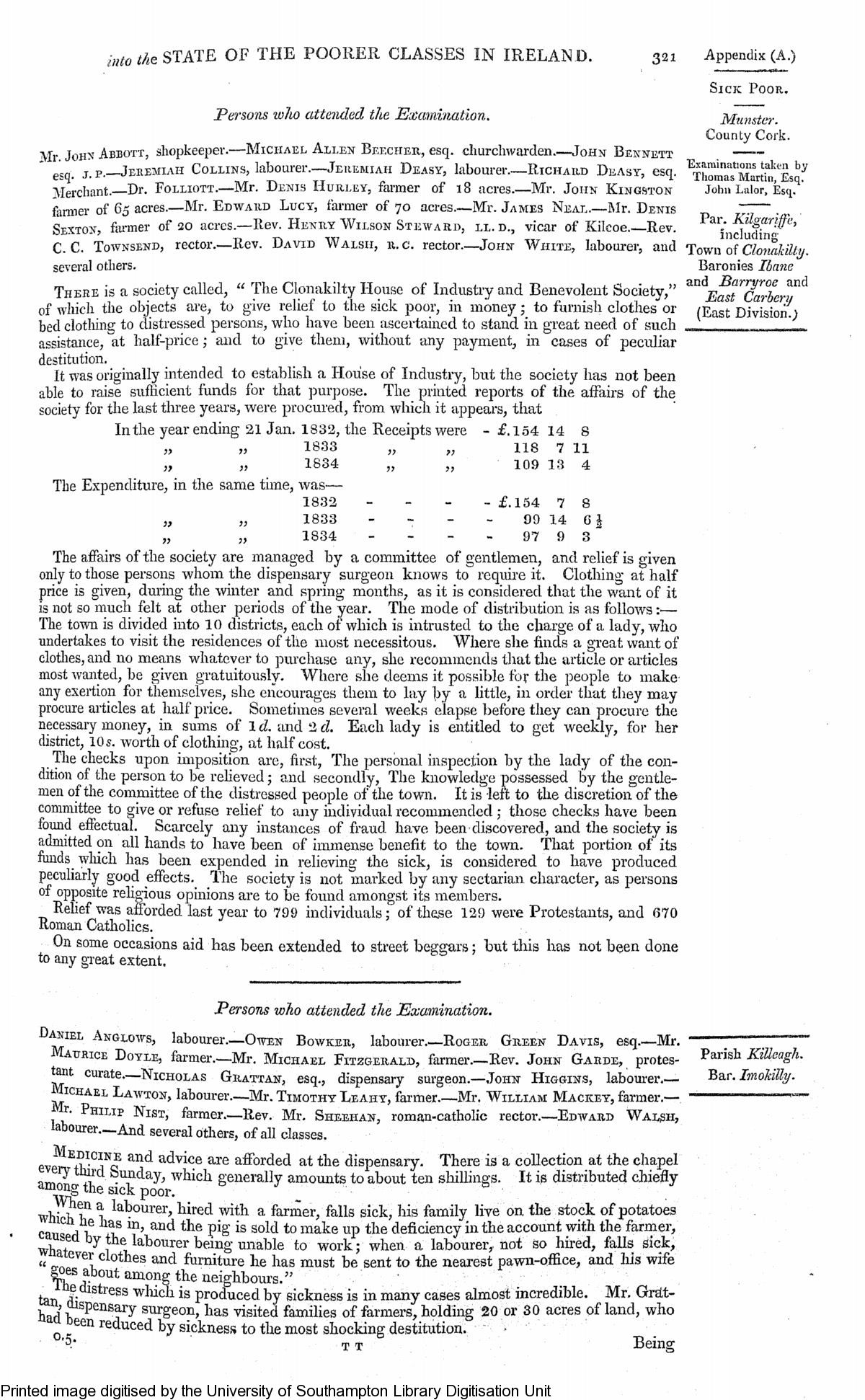into the STATE OF THE POORER CLASSES IN IRELAND.
Persons toho attended the Examination.
321 Appendix (A.)
Sick Poor.
"Mr John Abbott, shopkeeper.—Michael
Allen Beecher,, esq.
churchwarden.—John
Bennett esq< j, p.—Jeremiaii
Collins, labourer.—Jeremiah
Deasy, labourer.—Richard
Deasy, esq.
Merchant.—Dr.
Folliott.—Mr.
Dtnis Hurley, farmer of 18 acres.—Mr.
John Kingston farmer of 65 acres.—Mr.
Edward Lucy, farmer of 70 acres.—Mr.
James Neal.—Mr.
Denis Sexton, farmer of 20 acres.—Rev.
Henry Wilson Steward, ll.
d.,
vicar of Kilcoe.—Rev.
C.
C.
Townsend, rector.—Rev.
David Walsh, r.
c.
rector—John White, labourer, and several others.
There is a society called, " The Clonakilty House of Industry and Benevolent Society," of which the objects are, to give relief to the sick poor, in money; to furnish clothes or bed clothing to distressed persons, who have been ascertained to stand in great need of such assistance, at half-price; and to give them, without any payment, in cases of peculiar destitution.
It was originally intended to establish a House of Industry, but the society has not been able to raise sufficient funds for that purpose.
The printed reports of the affairs of the society for the last three years, were procured, from which it appears, that
In the year ending 21 Jan.
1832,
„ „
1833 1834
the Receipts were -£.154
14 8
118 7 11 109 13 4 The Expenditure, in the same time, was—
1832 „ „ 1833
1834
_ -£.154
7 8
99 14 6 97 9 3
Persons who attended the Examination.
Munster.
County Coik.
Examinations taken by Thomas Martin, Esq.
John Lalor, Esq.
Par.
Kilgariffe,
including Town of Clotiakilty.
Baronies Ibane and Barryroe and East Carbery (East Division.;
The affairs of the society are managed by a committee of gentlemen, and relief is given only to those persons whom the dispensary surgeon knows to require it.
Clothing at half price is given, during the winter and spring months, as it is considered that the want of it is not so much felt at other periods of the year.
The mode of distribution is as follows :— The town is divided into 10 districts, each of which is intrusted to the charge of a lady, who undertakes to visit the residences of the most necessitous.
Where she finds a great want of clothes, and no means whatever to purchase any, she recommends that the article or articles most wanted, be given gratuitously.
Where she deems it possible for the people to make any exertion for themselves, she encourages them to lay by a little, in order that they may procure articles at half price.
Sometimes several weeks elapse before they can procure the necessary money, in sums of 1 d.
and 2 d.
Each lady is entitled to get weekly, for her district, 10 s.
worth of clothing, at half cost.
The checks upon imposition are, first, The personal inspection by the lady of the con¬ dition of the person to be relieved; and secondly, The knowledge possessed by the gentle¬ men of the committee of the distressed people of the town.
It is left to the discretion of the committee to give or refuse relief to any individual recommended; those checks have been found effectual.
Scarcely any instances of fraud have been discovered, and the society is admitted on all hands to have been of immense benefit to the town.
That portion of its funds which has been expended in relieving the sick, is considered to have produced peculiarly good effects.
The society is not marked by any sectarian character, as persons of opposite religious opinions are to be found amongst its members.
Relief was afforded last year to 799 individuals; of these 129 were Protestants, and 670 Roman Catholics.
On some occasions aid has been extended to street beggars; but this has not been done to any great extent.
Daniel Anglows, labourer.—Owen
Bowker, labourer.—Roger,
Green Davis, esq.—Mr.
Maurice Doyle, farmer.—Mr.
Michael Fitzgerald, farmer—Rev.
John Garde, protes¬ tant curate—Nicholas Guattan, esq.,
dispensary surgeon.—John
Higgins, labourer.—
Michael Lawton, labourer.—Mr.
Timothy Leahy, farmer.—Mr.
William Mackey, farmer.—
Mr.
Philip Nist, farmer.—Rev.
Mr.
Sheeiian, roman-catholic rector.—Edward
Walsh, labourer.—And
several others, of all classes.
Medicine and advice are afforded at the dispensary.
There is a collection at the chapel very third Sunday, which generally amounts to about ten shillings.
It is distributed chiefly amrag the sick poor.
_ whi^T?
\ lalD°urer, hired with a farmer, falls sick, his family live on the stock of potatoes cai ^ i?
^ m' and tlle P*£ is sold t0 make UP tlle deficiency in the account with the farmer, ausea by the labourer being unable to work; when a labourer, not so hired, falls sick, watever clothes and furniture he has must be sent to the nearest pawn-office, and his wife goes about among the neighbours-tan I* IeBS wllich is Produced by sickness is in many cases almost incredible.
Mr.
Gntt-hadh PenSl1T slirSeon> llas visited families of farmers, holding 20 or
een reduced by sickness to the most shocking destitution.
0.5.
T T
of land, who
Beinsr
Parish Killeagh.
Bar.
ImoUlly.

